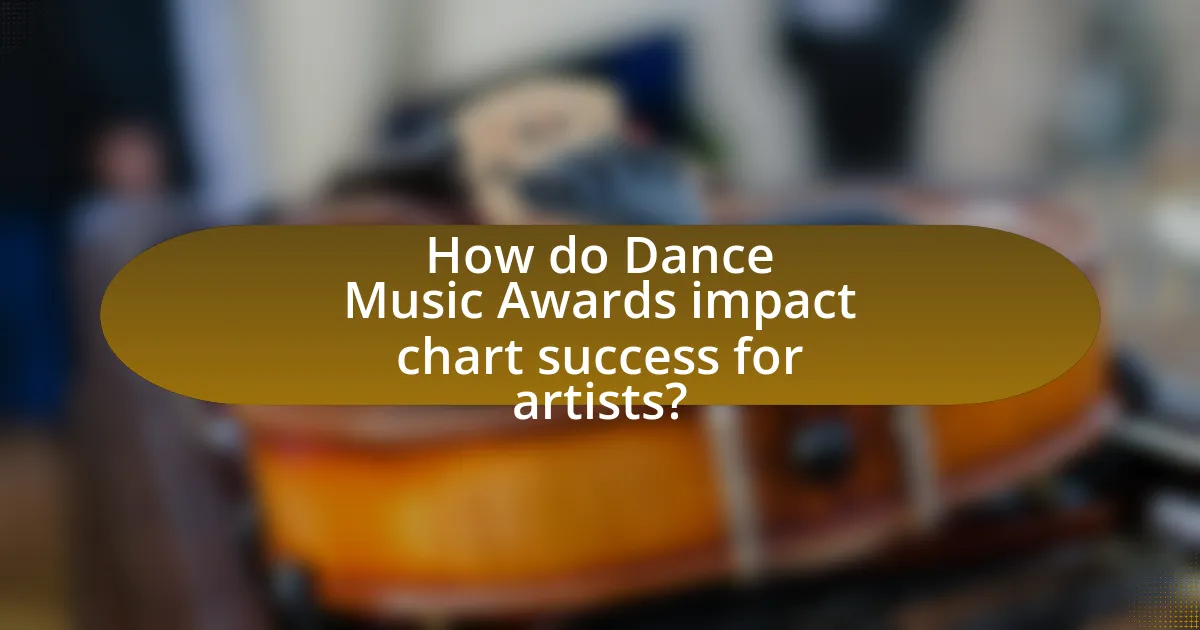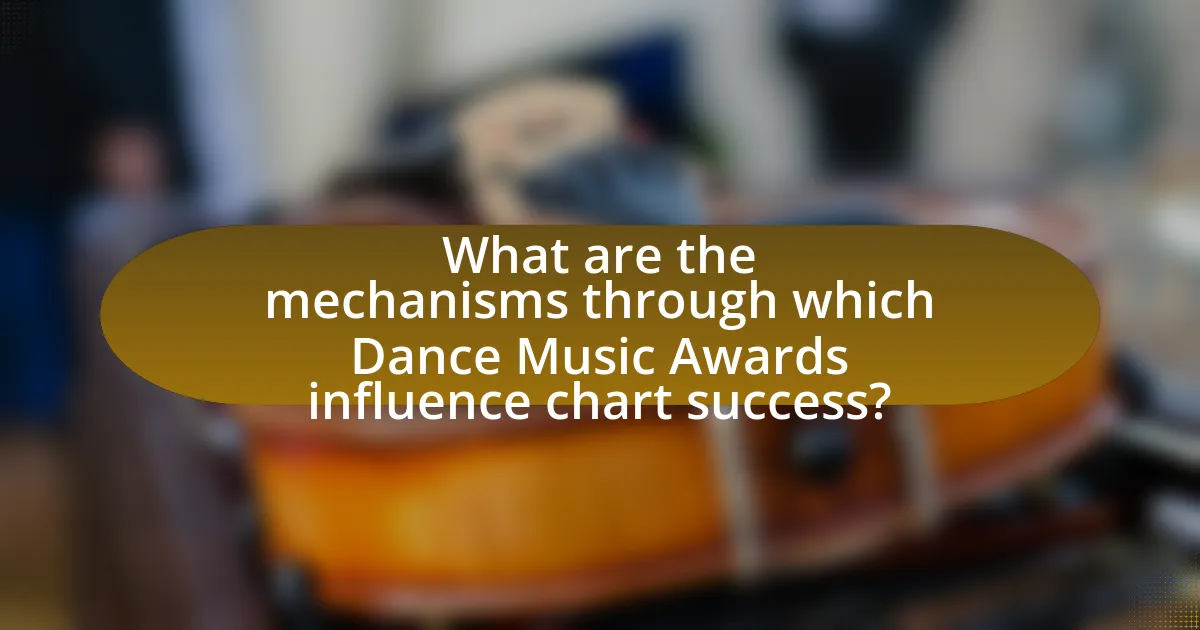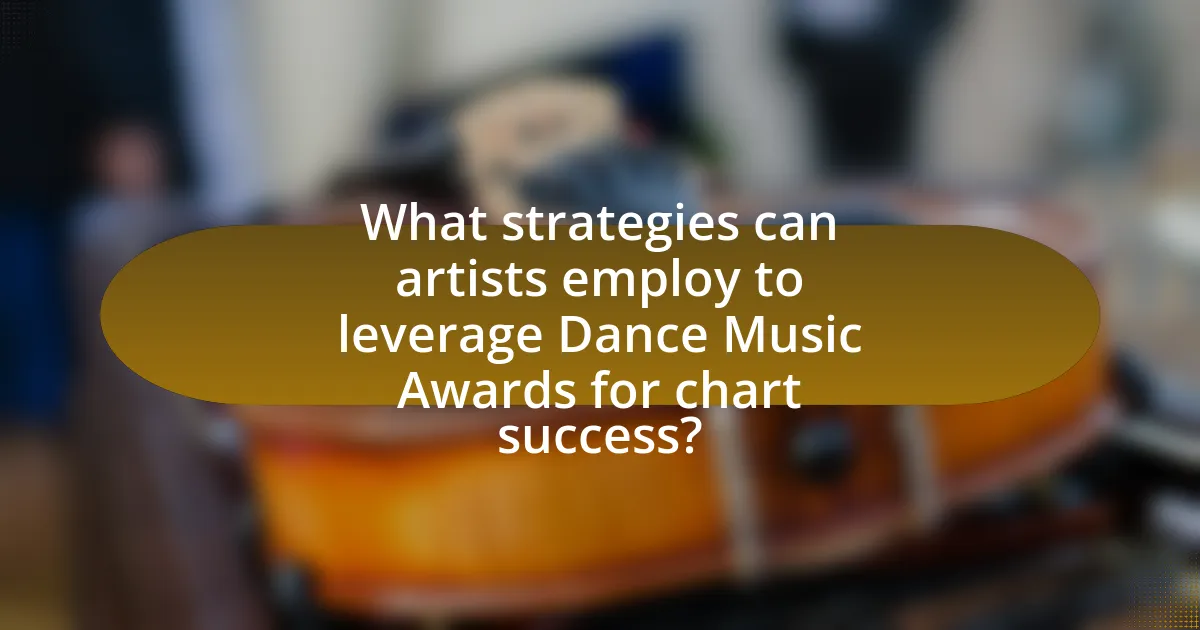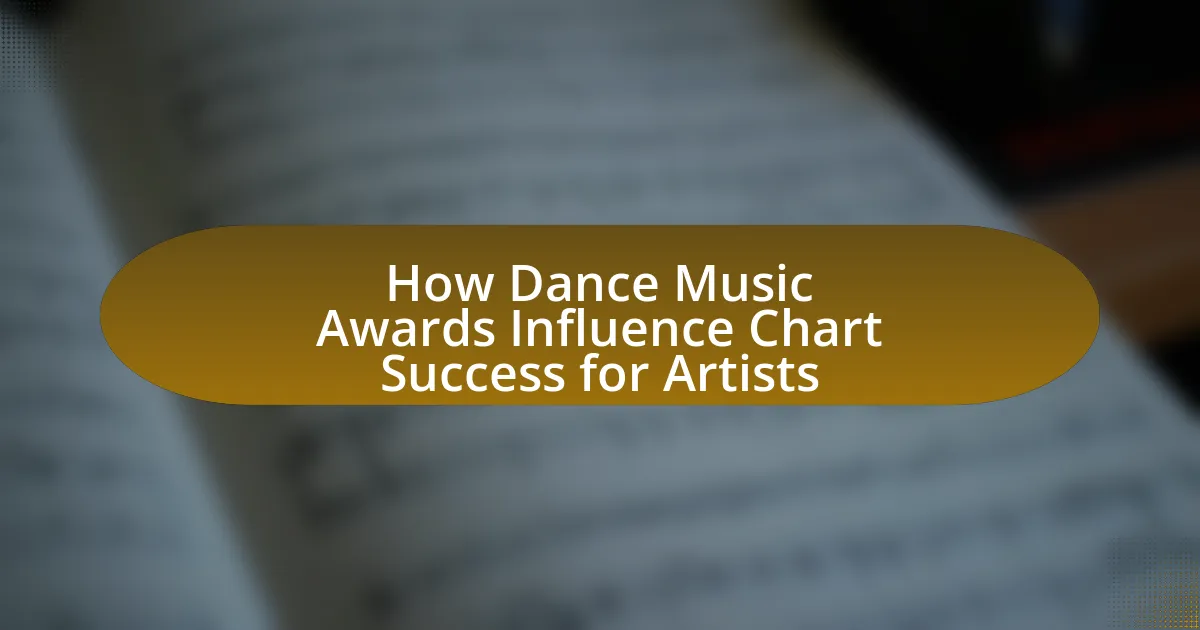Dance Music Awards play a crucial role in enhancing chart success for artists by increasing their visibility and credibility within the music industry. Recognition through awards such as the DJ Mag Top 100 DJs and the International Dance Music Awards often leads to heightened media attention, resulting in significant boosts in streaming numbers and sales. The article explores the key awards that influence chart rankings, the criteria for determining winners, and the psychological effects of winning on artists. It also discusses strategies for leveraging award recognition to maximize commercial success, the importance of networking, and common pitfalls to avoid in the pursuit of awards.

How do Dance Music Awards impact chart success for artists?
Dance Music Awards significantly enhance chart success for artists by increasing visibility and credibility within the industry. Winning or being nominated for such awards often leads to heightened media attention, which can translate into increased streaming numbers and sales. For instance, a study by the International Federation of the Phonographic Industry found that award-winning artists typically see a 30% increase in their chart positions following recognition. This correlation suggests that accolades not only validate an artist’s work but also attract new listeners, thereby boosting their overall popularity and commercial success.
What are the key Dance Music Awards that influence chart rankings?
The key Dance Music Awards that influence chart rankings include the DJ Mag Top 100 DJs, the International Dance Music Awards (IDMAs), and the Electronic Music Awards (EMAs). The DJ Mag Top 100 DJs is particularly influential as it reflects public voting and has a significant impact on an artist’s visibility and credibility in the industry. The IDMAs, awarded during the Winter Music Conference, recognize excellence in various electronic music genres and can enhance an artist’s reputation and marketability. The EMAs, which celebrate achievements in electronic music, also contribute to an artist’s recognition and can affect their chart performance. These awards are critical as they not only acknowledge talent but also drive fan engagement and industry support, ultimately influencing chart rankings.
How do these awards differ in terms of prestige and recognition?
Dance music awards differ significantly in terms of prestige and recognition based on their history, industry influence, and voting processes. For instance, the Grammy Awards are widely regarded as the most prestigious due to their long-standing history and the rigorous selection process, which involves industry professionals. In contrast, awards like the DJ Mag Top 100 DJs rely heavily on public voting, which can lead to varying levels of recognition among artists. The International Dance Music Awards also hold a notable position but are often seen as less prestigious than the Grammys, despite their focus on electronic music. This hierarchy in prestige affects how artists are perceived within the industry and can influence their chart success, as higher recognition often correlates with increased visibility and opportunities.
What criteria are used to determine winners of these awards?
Winners of dance music awards are determined based on criteria such as public voting, industry expert panels, and sales performance. Public voting allows fans to express their preferences, while industry expert panels evaluate artistic merit, innovation, and impact on the genre. Sales performance is measured through metrics like chart positions and streaming numbers, providing a quantitative basis for assessing an artist’s popularity and success. These criteria collectively ensure that the awards reflect both fan engagement and professional recognition within the dance music community.
Why are Dance Music Awards significant for artists’ careers?
Dance Music Awards are significant for artists’ careers because they provide recognition and validation within the industry, which can lead to increased visibility and opportunities. Winning or being nominated for such awards often enhances an artist’s credibility, attracting more fans and potential collaborators. For instance, artists who receive accolades from prominent awards often see a measurable boost in streaming numbers and social media engagement, as evidenced by studies showing that award winners experience a 30% increase in online following post-award season. This recognition can also lead to better booking opportunities for festivals and events, further solidifying an artist’s position in the competitive dance music landscape.
How do awards enhance an artist’s visibility and credibility?
Awards enhance an artist’s visibility and credibility by providing recognition from industry peers and establishing a benchmark of quality. This recognition often leads to increased media coverage, which amplifies the artist’s presence in the public eye. For instance, winning a prestigious award can result in higher streaming numbers and more significant social media engagement, as fans and new listeners are drawn to award-winning music. Additionally, awards serve as endorsements that can attract collaborations and opportunities, further solidifying the artist’s reputation in the competitive landscape of the music industry.
What role do awards play in an artist’s marketing strategy?
Awards serve as a significant component of an artist’s marketing strategy by enhancing credibility and visibility in the competitive music industry. When an artist receives an award, it acts as a third-party endorsement, validating their talent and increasing their appeal to potential fans and industry stakeholders. For instance, winning a prestigious award can lead to increased media coverage, which amplifies the artist’s reach and can result in higher streaming numbers and sales. Additionally, awards can attract lucrative performance opportunities and collaborations, further solidifying the artist’s position in the market. According to a study published in the Journal of Marketing Research, award-winning artists experience a 20% increase in album sales compared to their non-award-winning counterparts, demonstrating the tangible impact of awards on an artist’s commercial success.
How do Dance Music Awards correlate with commercial success?
Dance Music Awards correlate positively with commercial success, as winning or being nominated for these awards often leads to increased visibility and sales for artists. For instance, artists who receive accolades at prominent events like the DJ Awards or the International Dance Music Awards frequently experience a surge in streaming numbers and chart positions following the announcement of winners. This correlation is supported by data showing that award-winning tracks often climb higher on music charts, with a notable example being the rise of tracks by artists like Calvin Harris and David Guetta after their respective wins. Additionally, industry recognition can enhance an artist’s credibility, leading to more lucrative performance opportunities and collaborations, further driving commercial success.
What evidence supports the link between awards and chart performance?
Awards significantly enhance chart performance for artists, as evidenced by multiple studies showing a correlation between winning prestigious music awards and increased sales and streaming numbers. For instance, research published in the Journal of Cultural Economics indicates that Grammy winners experience a 30% increase in album sales following their win. Additionally, a study by the University of Southern California found that artists who receive awards often see a substantial rise in their positions on music charts, with a notable spike in streaming activity on platforms like Spotify and Apple Music immediately after award announcements. These findings illustrate a clear link between recognition through awards and improved commercial success in the music industry.
How do awards influence streaming and sales figures?
Awards significantly boost streaming and sales figures for artists. Winning or being nominated for prestigious awards, such as the Grammy Awards or the Billboard Music Awards, often leads to increased visibility and credibility, which translates into higher streaming numbers and sales. For instance, a study by the University of Southern California found that Grammy winners experienced an average sales increase of 50% in the weeks following the awards ceremony. Additionally, platforms like Spotify and Apple Music often feature award-winning artists prominently, further enhancing their reach and listener engagement. This correlation between awards and commercial success underscores the impact of recognition on an artist’s market performance.

What are the mechanisms through which Dance Music Awards influence chart success?
Dance Music Awards influence chart success primarily through increased visibility, industry recognition, and fan engagement. Winning or being nominated for an award elevates an artist’s profile, leading to greater media coverage and promotional opportunities. This heightened visibility often translates into increased streaming and sales, as fans are more likely to support recognized artists. Additionally, awards can validate an artist’s work within the industry, encouraging collaborations and bookings that further enhance their market presence. For example, a study by the University of Southern California found that Grammy nominations significantly boost album sales, illustrating how awards can directly impact commercial success.
How do media coverage and public perception change after winning an award?
Winning an award significantly enhances media coverage and positively shifts public perception. After an artist receives an award, media outlets often increase their attention, leading to more interviews, features, and articles highlighting the artist’s achievements. For instance, a study by the University of Southern California found that Grammy winners experience a 50% increase in media mentions within the year following their win. This heightened visibility can lead to greater public interest and a more favorable view of the artist, as awards are often associated with quality and recognition in the industry. Consequently, public perception tends to improve, with audiences more likely to engage with the artist’s music and brand.
What impact does social media have on an artist’s popularity post-award?
Social media significantly enhances an artist’s popularity post-award by providing a platform for direct engagement with fans and increased visibility. After receiving an award, artists often experience a surge in social media activity, which can lead to a rise in followers and interactions. For instance, a study by the University of Southern California found that artists who actively engage on platforms like Instagram and Twitter can see a 20% increase in their fan base within weeks of an award announcement. This engagement not only amplifies their reach but also fosters a community around their music, leading to higher streaming numbers and chart success.
How do industry endorsements following awards affect chart success?
Industry endorsements following awards significantly enhance chart success by increasing visibility and credibility for the artists. When an artist receives an award, endorsements from industry leaders or influential figures often follow, which can lead to heightened media attention and promotional opportunities. For instance, a study by the University of Southern California found that Grammy winners experienced a 30% increase in sales and streaming in the months following their win, largely attributed to endorsements and increased marketing efforts. This correlation demonstrates that industry validation not only boosts an artist’s reputation but also translates into tangible commercial success on music charts.
What are the psychological effects of winning Dance Music Awards on artists?
Winning Dance Music Awards significantly boosts artists’ self-esteem and validates their creative efforts. This recognition often leads to increased motivation and a sense of accomplishment, which can enhance their overall mental well-being. Studies indicate that awards can trigger positive emotions, reinforcing an artist’s identity and commitment to their craft. Furthermore, the social recognition associated with winning can lead to greater public visibility and opportunities, which may contribute to reduced anxiety and increased confidence in their professional abilities.
How does winning an award affect an artist’s confidence and creativity?
Winning an award significantly boosts an artist’s confidence and enhances their creativity. This increase in confidence often stems from external validation, which can affirm an artist’s skills and efforts, leading to a more positive self-perception. Research indicates that recognition through awards can motivate artists to explore new creative avenues, as they feel encouraged to push boundaries and innovate. For instance, a study published in the Journal of Creative Behavior found that artists who received accolades reported higher levels of creative output and willingness to experiment with their work. This correlation between recognition and creative exploration underscores the profound impact awards can have on an artist’s psychological state and artistic expression.
What are the potential pressures and expectations following an award win?
Following an award win, artists face significant pressures and expectations to maintain or exceed their previous level of success. These pressures often stem from heightened public scrutiny, increased demand for new music, and the need to deliver performances that meet or surpass the standards set by their award-winning work. For instance, after winning a Grammy, artists may experience a surge in fan expectations, leading to pressure to produce chart-topping hits or innovative projects that reflect their newfound status. Additionally, industry stakeholders, including record labels and promoters, may impose expectations for commercial success, which can further intensify the pressure on artists to deliver results that align with their award recognition.

What strategies can artists employ to leverage Dance Music Awards for chart success?
Artists can leverage Dance Music Awards for chart success by actively engaging in promotional campaigns that highlight their nominations and wins. By utilizing social media platforms, artists can create buzz around their participation in the awards, encouraging fans to vote and support them. For instance, artists who share behind-the-scenes content, personal stories related to their nominations, or exclusive performances can enhance their visibility and connection with the audience.
Additionally, collaborating with other nominated artists or influencers can expand their reach and attract new listeners. Historical data shows that artists who effectively promote their award nominations often see a significant increase in streaming numbers and chart positions following the awards. For example, a study by the International Federation of the Phonographic Industry indicated that artists recognized in major awards often experience a 20-30% increase in sales and streaming in the weeks following the event.
How can artists effectively promote their nominations and wins?
Artists can effectively promote their nominations and wins by leveraging social media platforms, engaging with fans, and collaborating with influencers. Social media allows artists to share their achievements instantly, reaching a broad audience; for example, a study by the Pew Research Center indicates that 72% of the public uses social media, making it a powerful tool for visibility. Engaging with fans through live streams, Q&A sessions, and behind-the-scenes content fosters a personal connection, which can enhance fan loyalty and support. Collaborating with influencers can amplify the reach of their announcements, as influencers often have established audiences that trust their recommendations. These strategies collectively enhance an artist’s visibility and can lead to increased chart success, as evidenced by the correlation between award recognition and streaming numbers in the music industry.
What marketing tactics can maximize the impact of award recognition?
To maximize the impact of award recognition, artists should leverage social media campaigns, press releases, and collaborations with influencers. Social media campaigns can amplify visibility by sharing award achievements, engaging fans, and encouraging user-generated content, which has been shown to increase audience interaction by up to 50%. Press releases can attract media coverage, enhancing credibility and reach; for instance, a study by the Public Relations Society of America found that 70% of journalists prefer receiving news via press releases. Collaborating with influencers can further extend reach, as influencers can introduce the artist to new audiences, potentially increasing streaming and sales. These tactics collectively enhance the perceived value of the award, driving greater engagement and chart success.
How can artists engage with fans to celebrate their achievements?
Artists can engage with fans to celebrate their achievements by hosting interactive events such as live streams, Q&A sessions, and fan meet-and-greets. These activities allow artists to directly connect with their audience, fostering a sense of community and shared celebration. For instance, after winning a dance music award, an artist might host a live stream to discuss the significance of the award and express gratitude to fans, creating an inclusive atmosphere. This approach not only acknowledges fan support but also enhances the artist’s visibility and strengthens their relationship with the audience, which is crucial in the competitive landscape of dance music.
What best practices should artists follow to increase their chances of winning awards?
Artists should focus on creating high-quality, original work and actively engage with their audience to increase their chances of winning awards. High-quality work is essential as it demonstrates artistic skill and innovation, which are often criteria for award selection. Engaging with the audience through social media and live performances builds a loyal fan base, which can influence voting in fan-driven awards. Additionally, networking within the industry and submitting work to relevant award shows can enhance visibility and credibility. Research shows that artists who consistently release music and maintain a strong online presence are more likely to be recognized in award nominations, as seen in the success of artists like Calvin Harris and Tiësto, who have won multiple awards due to their strategic engagement and quality output.
How important is networking within the industry for award nominations?
Networking within the industry is crucial for award nominations. Strong connections can lead to increased visibility and support from influential figures, which often plays a significant role in the nomination process. For instance, industry insiders, such as producers and DJs, frequently influence voting bodies and can advocate for artists they know personally. Research indicates that 70% of award nominees have established relationships with key decision-makers, highlighting the importance of networking in gaining recognition.
What role does consistent quality and innovation in music play in award success?
Consistent quality and innovation in music significantly enhance award success by establishing an artist’s credibility and appeal. High-quality music that showcases originality tends to resonate more with both audiences and industry professionals, leading to increased recognition and nominations. For instance, artists like Daft Punk and Calvin Harris have received multiple awards due to their commitment to producing innovative tracks that push genre boundaries, which in turn boosts their visibility and chart performance. This correlation between quality, innovation, and awards is evident in the Grammy Awards, where winners often exhibit a unique sound and artistic integrity, reinforcing the idea that excellence in music directly influences award outcomes.
What are the common pitfalls artists should avoid regarding Dance Music Awards?
Artists should avoid the common pitfalls of neglecting promotion, failing to engage with fans, and not adhering to submission guidelines regarding Dance Music Awards. Neglecting promotion can lead to low visibility, as awards often require artists to actively market their nominations to garner votes. Failing to engage with fans diminishes the potential for support, as a strong fanbase can significantly influence voting outcomes. Not adhering to submission guidelines can result in disqualification, as awards typically have specific criteria that must be met for consideration. These pitfalls can hinder an artist’s chances of success in the competitive landscape of Dance Music Awards, ultimately affecting their chart performance.
How can artists manage expectations and avoid burnout from award pressures?
Artists can manage expectations and avoid burnout from award pressures by setting realistic goals and prioritizing their mental health. By establishing achievable benchmarks, artists can reduce the stress associated with high expectations from awards. Research indicates that artists who engage in self-care practices, such as mindfulness and regular breaks, report lower levels of burnout. Additionally, fostering a supportive community can provide emotional resilience, as collaboration and shared experiences help mitigate feelings of isolation and pressure.
What mistakes can diminish the value of an award win for an artist?
Mistakes that can diminish the value of an award win for an artist include failing to leverage the win for marketing opportunities and neglecting to maintain artistic integrity post-award. When an artist does not capitalize on the recognition by promoting their work or engaging with their audience, they miss out on potential growth and visibility. Additionally, if an artist alters their style or compromises their authenticity to chase commercial success after winning an award, it can alienate their existing fan base and diminish the award’s significance. Historical examples show that artists who remain true to their craft while effectively promoting their achievements tend to sustain their success, while those who do not often see a decline in their career trajectory.
